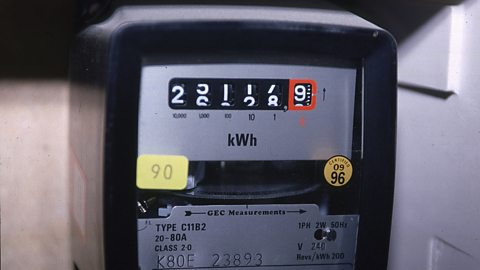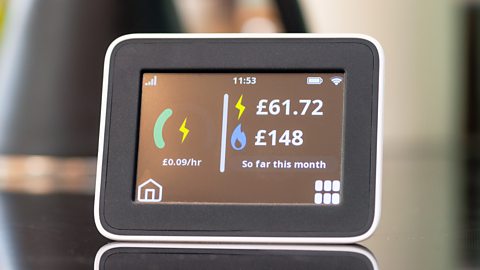Cost of household electricity using meter readings
Electricity companies bill customers for the electrical energy they use.
A joule is much too small a unit of energy and so the electricity companies use another unit of energy called the kilowatt-hour, kWh.
One unit of electrical energy is one kilowatt-hour, or 1 kWh.
Electricity meters


Domestic electricity meters, similar to those above, measure the number of kilowatt-hours of electrical energy used in a home or other building.
The more kilowatt-hours (or units) used, the greater the cost.
The cost of the electricity used is calculated using this equation:
Total cost = energy in kWh Ă— cost per unit
The cost per unit is set by the electricity company, for example 14.78 p per kWh.
This means that each unit, or kilowatt-hour, of electricity costs 14.87 p.
An electricity bill has two important numbers: present meter reading and previous meter reading.
The number of units used is the difference between these two readings.
Present reading = 40745 kWh
Previous reading = 39990 kWh
Energy in kWh = present meter reading - previous meter reading
= 40745 – 39990
= 755 kWh
Total cost = energy in kWh Ă— cost per unit
= 755 x 14.78 p
= 11159 p
The cost of electricity used is ÂŁ111.59
Question
Use the following information to calculate the cost of electricity used.
Previous reading = 37070 kWh
Present reading = 38217 kWh
Units at 14.78p per kWh.
Energy in kWh = present meter reading - previous meter reading
= 38217 – 37070
= 1147 kWh
Total cost = energy in kWh Ă— cost per unit
= 1147 x 14.78p
= 16953 p
= ÂŁ169.53
The cost of electricity used is ÂŁ169 .53.
In 2019, the average household electricity bill for the year cost around ÂŁ590, in comparison to 2013 when it cost around ÂŁ650 - this could be caused by many household items becoming more energy efficient.
Ways of reducing electricity bills:
- Use energy efficient light bulbs such as LED bulbs.
- Switch off and unplug devices on stand-by.
- Switch off and unplug chargers when not in use.
- If you are replacing an electrical appliance such as a tumble dryer, kettle or hair dryer choose an energy efficient model.
- Minimize the time spent in an electric shower.
- If possible, hang washing out to dry rather than use a tumble dryer.